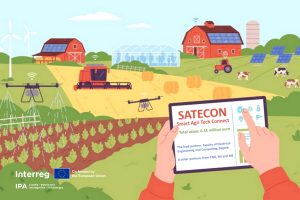Smart, innovative and sustainable agriculture (SATECON)
Priority Axis 1: Smart investments in research, innovation and competitive entrepreneurship
Operation start date: 01 September 2025
Operation completion date: 31 August 2028
Budget: EUR 6.399.915,28
Number of partners: 9
Operation purpose and expected achievements:
The goal of the project is to enhance agricultural competitiveness in the cross-border regions of Croatia, Bosnia and Herzegovina, and Montenegro by developing smart agriculture.
Most small farmers in the cross-border area still rely on traditional production methods that are no longer competitive. Through this project, strategies will be developed to support the effective adoption of smart agriculture tools and technologies.
The project will focus on six key agricultural sectors: viticulture, fruit growing, olive growing, livestock farming, greenhouse cultivation, and mariculture. Advanced technologies such as drones, sensors, automation, data analysis, and robotic systems will be used. One of the key challenges will be to strengthen collaboration between the IT sector and agricultural experts. Pilot projects will be implemented at various locations, with a strong emphasis on encouraging cooperation among producers and knowledge exchange.
In addition to enhancing agricultural competitiveness, the project is expected to attract new, young farmers and strengthen local production, thus creating the preconditions for revitalizing rural areas.
Beneficiaries:
The Lead Partner (LP), University of Zagreb – Faculty of Electrical Engineering and Computing (HR), is responsible for the overall administrative, financial, and technical management of the project. They are leading the development of software solutions, hardware design, and drone autonomy. As the project’s technical coordinator, they are also responsible for ensuring that all technological aspects of the project are successfully implemented.
Croatian Agency for Agriculture and Food (HR) is involved in the development of precision agriculture solutions and contributes with its expertise in soil and agrochemical analysis. It is responsible for implementing pilot projects in Croatia, where the developed solutions will be tested in real-world scenarios. The Agency is also playing a key role in capacity building and engaging farmers, ensuring the project’s results are effectively transferred to the end-users.
Ministry of Agriculture, Forestry and Water Management of Republic of Srpska (BA) is participating in most of the project’s activities, particularly those related to project management and dissemination. Its primary role is to ensure the joint preparation, implementation, and reporting of project activities. Through its agricultural extension service, the Ministry is instrumental in mobilizing the farming community and promoting the adoption of good practices and lessons learned.
Ministry of Agriculture, Forestry and Water Management of the Federation of Bosnia and Herzegovina (BA) is contributing to the project by analyzing and helping to implement new policies related to agriculture. The technical team from this Ministry is actively participating across all four work packages, with a specific focus on examining the legislative framework and creating related guidelines. Their involvement is crucial for ensuring that the project’s results align with and influence national agricultural policies.
University of Banja Luka – Faculty of Agriculture (BA) is actively participating in various project activities. Its specific contributions include establishing a “SATECON classroom” to provide a practical training environment for students and professionals. They are also involved in the development of educational curricula and lifelong learning programs to ensure the long-term sustainability of the project’s knowledge transfer.
University of Mostar – Faculty of Agriculture and Food Technology (BA) has a role of contributing to the development of specific technological packages for olive farming and smart greenhouses. The Faculty is involved in updating existing academic curricula and creating new lifelong learning programs to embed the project’s knowledge into formal education. They are also assisting in disseminating project results by collaborating with regional and international networks.
Dzemal Bijedic University of Mostar – Agromediterranean Faculty (BA) is ensuring the transferability of project results by actively spreading information to all stakeholders through various channels. They are establishing a training center for alternative technologies in agriculture to provide ongoing training and support. The Faculty is also promoting the technological solutions and pilot site details to raise awareness about the necessity of using new technologies in the agricultural sector.
Ministry of Agriculture, Forestry and Water Management of Montenegro (ME) role is supporting joint training initiatives and contributing to the development of strategic and project action plans. The Ministry will also facilitate the adoption of project outcomes by local stakeholders. Their involvement is essential for ensuring the project’s objectives are met within Montenegro and for promoting cross-border collaboration.
University of Montenegro (ME) is bringing expertise in agriculture, smart technologies, and environmental sustainability, leveraging the knowledge of its Biotechnical Faculty and Institute of Marine Biology. The University is a key contributor to the smart mariculture pilot action, applying its specialized knowledge to develop and test innovative solutions. It is also involved in broader agricultural research and dissemination activities to ensure the project’s scientific rigor and impact.
 Jems
Jems
